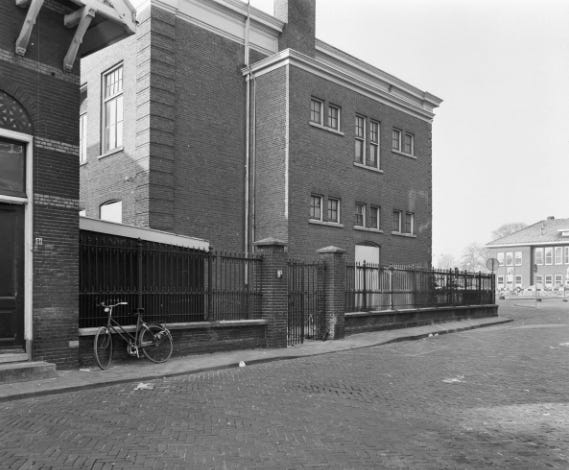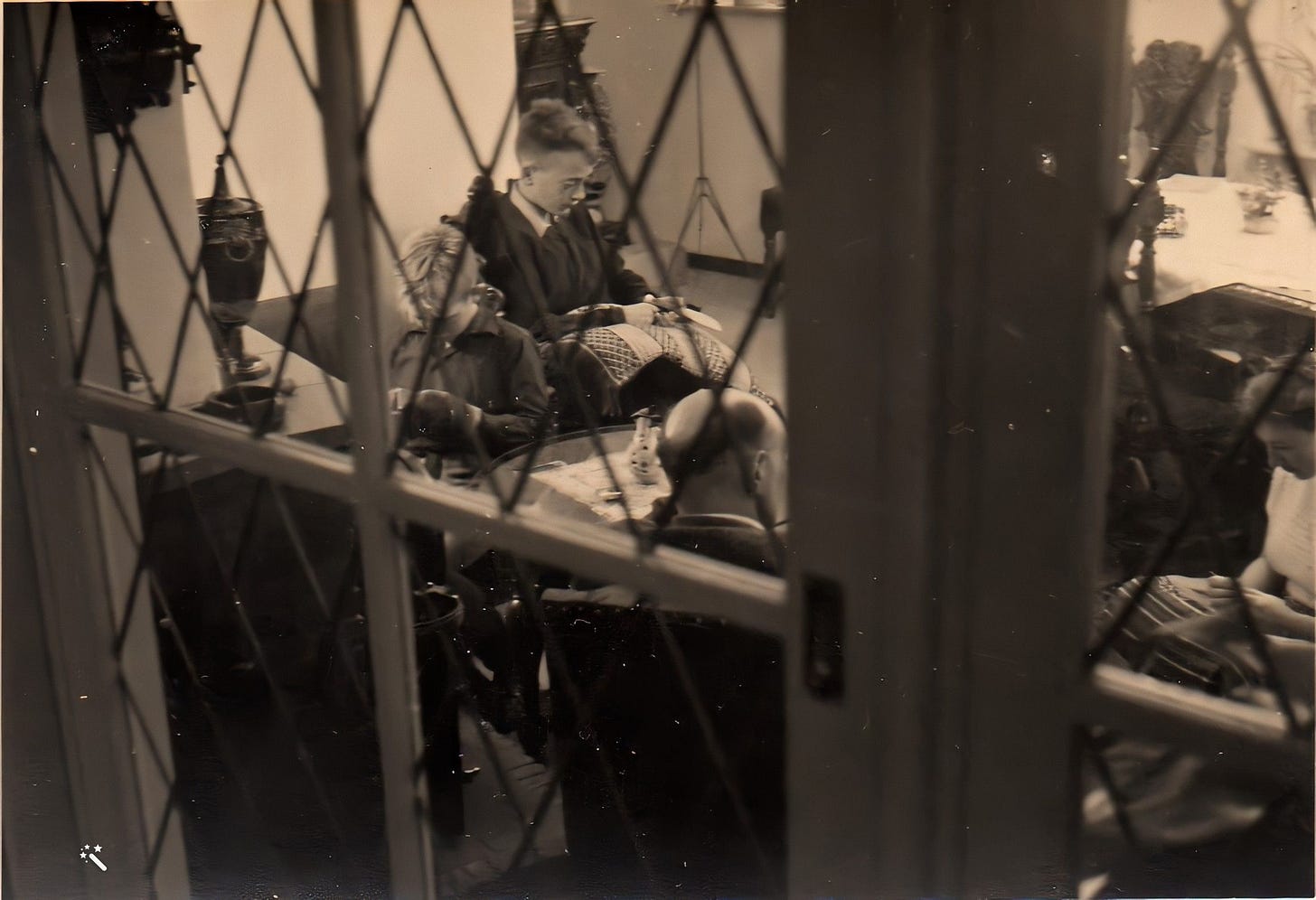Before I left for Switzerland, they had given me some schoolbooks and I thought I had studied those pretty well, but it was still very hard to catch up. The first winter there wasn't enough fuel for the central heating. At times the school was closed, other times we sat in the classroom with our coats on. The best part was the train ride to school. I had outgrown my little children's bike and new bikes were still not available, so it was the train, a long steam train mainly of freight wagons without doors and with wooden forms to sit on. Only one carriage was really nice. Long before the war that one had been the private carriage of the old queen, Queen Wilhelmina. There were upholstered seats along the sides with a space for a table in the middle. The porcelain toilet bowl was a true work of art with an intricate flower pattern in subtle colours in the glaze.
The trains went very slowly as the track had not been fully repaired and they suspected there were still land mines around along one stretch. [1] More than 20 minutes for about 11 Km. We didn't mind, sometimes when the train went extra slowly, we would clamber out and run alongside.
Part of Alkmaar was not on the sewer yet in those days, but at least the school had proper plumbing. On Wednesday mornings we always met the night cart - which in Holland did the rounds during the day: a big flat horse-drawn cart. Men with leather shoulder pads and aprons took wooden buckets to all the houses and carried the full ones back to the cart. I always wondered what would happen to really big families if one bucket a week was not enough.'
'Yuck. What was your favourite subject, Grandpa?'
'Two actually, biology and mathematics. I liked physics and chemistry too, but biology was my first choice. I didn't like the way they taught art though, it was too boring. They had a lot of plaster busts of old Greek philosophers and Roman emperors and we were supposed to make pencil drawings of those things. One day the teacher had something more exciting, he told us. A big black earthenware jug. He put that on the dais in front of the class and told us to make as accurate a drawing of it as we could. Then he left the classroom for a moment and we started to fool around. Someone knocked over the jug and made a crack in the side. We carefully turned the jug so he wouldn't notice it, but I drew that crack in my drawing.
The next week he made me stand in front of the class: 'Art is very serious business,' he said. 'How dare you spoil a perfectly good drawing with that stupidity. I'm giving you the lowest mark you've ever had.'
'But I thought you wanted us to make an accurate drawing? What's wrong with that one?'
'You ruined it with that so-called crack.'
'But the jug did have a crack in it like that.'
'Nonsense, don't be cheeky.'
My classmates backed me up; he got the jug out of the cupboard and discovered the crack.
'I'm amazed,' he said. 'I didn't know that.' And he gave me a top mark instead 'for being so observant.'
Our regular school week was four whole days: Monday, Tuesday, Thursday, and Friday, and two half days on Wednesday and Saturday morning. I usually left my weekend homework till Sunday night, so I could go straight to the beach on Saturday afternoon to go swimming or camping.'
'Did you like your teachers, Grandpa?'
'I suppose I liked two of them, or rather I respected them. Both the biology teacher and the physics teacher seemed to enjoy talking about their subject so much that you couldn't help getting interested. But the rest were just teachers, not real people. Teachers who had been teaching the same things to class after class, year after year. They must have been just as bored with their jobs as we were with them. Except for the French teacher, he was such a hopeless character, I could only feel contempt for him. In the end, I tended to simply ignore him. Later on, as an art student in Paris, I found I had picked up more French than I ever thought, but at the time? Our term reports were graded from 1 to 10 and one time I got a 10 for maths and directly underneath on my report card a 1 for French. The maths teacher wasn't too bad either, except one day when we got the tests back for that term and he made me stay after class.
'How did you arrive at the solution of that last problem?' he asked.
'Why? Was it wrong?'
'No, but you're not supposed to know that method. I won't be teaching you that till next year. Where did you learn it?'
'I made it up.'
'You can't have.'
'I did so. And I can show you why that method had to work.'
I don't think he ever really believed me.
High School wasn't like here, where you can choose your subjects: just about everything was compulsory. Four languages: French, English, German, and of course Dutch. Then biology; physics; chemistry; maths; history; geography and art. And of course one hour a week phys. ed: hockey in summer, soccer in winter. We had two voluntary subjects as well in the third year: bookkeeping and political economy, but that was Wednesdays after lunch, so half the kids didn't take it. They didn't teach music there. Pity, I would have loved that. After the first two years, we could choose between the A and the B stream for the remaining three years. Still with the same subjects, the emphasis of the A curriculum was on languages, while the B side was more science-orientated.
All in all, it was a pretty full programme, with lots of homework, but we didn't know any better. Mind you, later at the Art Academy we worked at least as hard, that was really tough. Of the 160 who sat the entrance exam no more than 80 were accepted, and only 16 of us passed the finals four years later. So, the odds were not very good. I was the only one who was allowed to do a post-graduate year as well, I was lucky.
All the same, High School wasn't easy. I had a lot to catch up and I got stacks of homework.
In the evenings Mum would sit at the head of the table, mending clothes, and I sat at the long side, doing my homework. Usually till 11.30 or midnight. Dad would sit at the short end of the table to give other students extra maths lessons. Because of his training as a merchant navy officer, he was good at maths. He'd do anything to earn a little extra, as we were still desperately short of money.
[1] 1946






